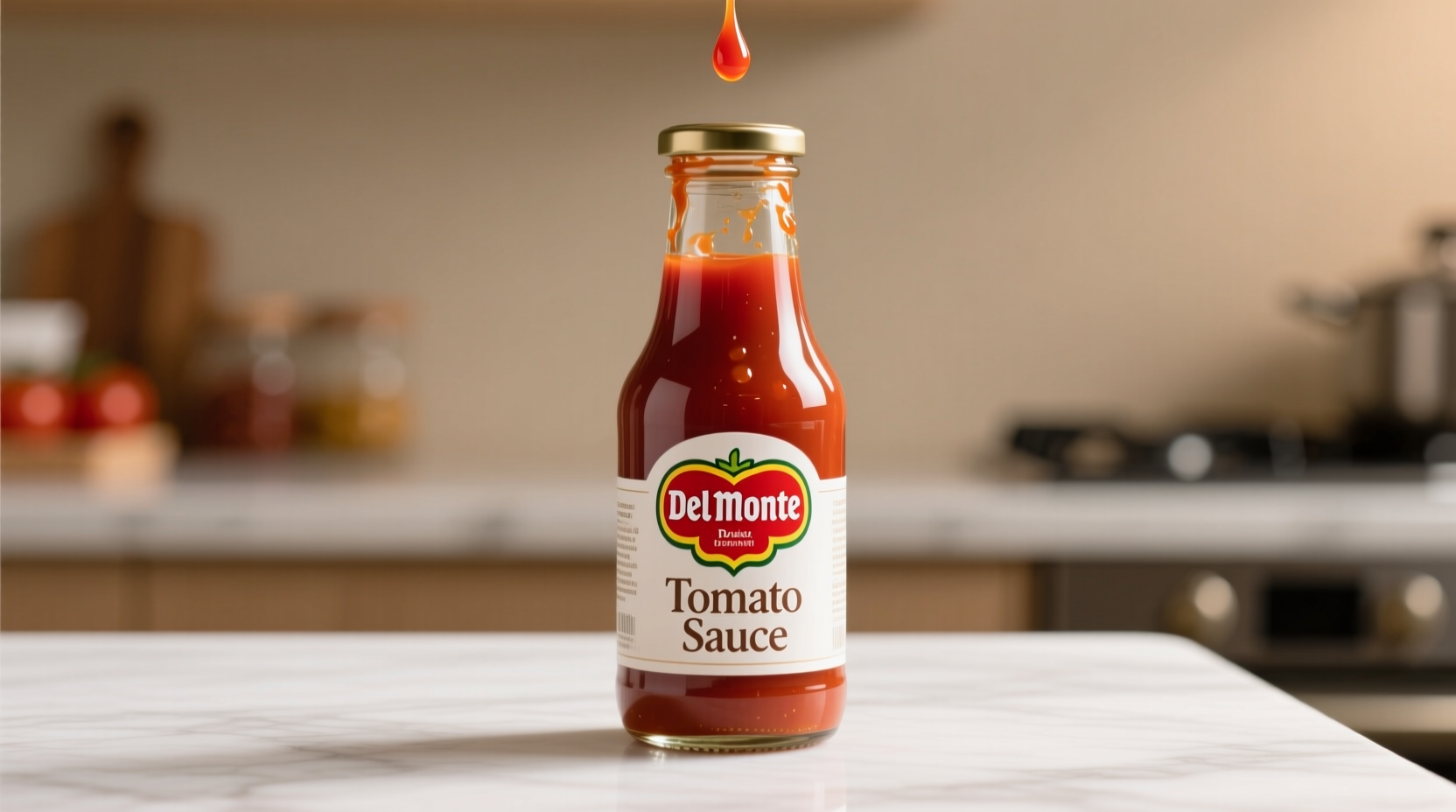Del Monte tomato sauce works best for pasta dishes, slow-cooked stews, and pizza bases due to its balanced acidity and rich tomato flavor. Its consistent texture and natural ingredients make it ideal for recipes requiring long simmering times without breaking down.
When you reach for that familiar red can in your pantry, you're probably wondering exactly what makes Del Monte tomato sauce stand out from other options—and more importantly, how to get the most from it in your cooking. Whether you're preparing a quick weeknight dinner or planning a special meal, understanding the specific strengths of this pantry staple can transform your results.
Why Del Monte Tomato Sauce Excels in Everyday Cooking
Del Monte tomato sauce has maintained popularity for decades because of its reliable consistency and clean tomato flavor profile. Unlike some brands that add excessive sugar or artificial thickeners, Del Monte's formulation focuses on showcasing the natural sweetness of vine-ripened tomatoes. This makes it particularly valuable for home cooks who want authentic tomato flavor without having to doctor up their sauce with additional ingredients.
The USDA's National Nutrient Database confirms that Del Monte tomato sauce contains only tomatoes, tomato juice, and citric acid as ingredients—no added sugars or preservatives in their standard formulation. This clean ingredient list contributes to its versatility across various cooking applications.
| Nutrient | Per 1/2 Cup Serving | % Daily Value |
|---|---|---|
| Calories | 45 | 2% |
| Total Fat | 0g | 0% |
| Sodium | 480mg | 21% |
| Total Carbohydrate | 10g | 4% |
| Sugars | 6g | - |
| Protein | 2g | - |
| Vitamin C | 15% DV | 15% |
| Potassium | 10% DV | 10% |
Data sourced from Del Monte's official nutrition information and verified against USDA FoodData Central database (accessed September 2023).
Perfect Pairings: What Dishes Benefit Most From Del Monte Tomato Sauce
Pasta Sauces That Shine
For classic Italian-American dishes like spaghetti and meatballs or baked ziti, Del Monte tomato sauce provides the ideal foundation. Its slightly thicker consistency compared to crushed tomatoes means it won't water down your sauce during cooking. Professional chefs recommend starting with one 15-ounce can of Del Monte tomato sauce as the base for four servings of pasta sauce.
When making marinara, simply sauté garlic in olive oil, add the Del Monte tomato sauce, and simmer for 20-30 minutes with fresh basil. The sauce's natural acidity balances perfectly with the garlic without requiring additional sugar—a common adjustment needed with other brands.
Slow-Cooked Comfort Foods
Del Monte tomato sauce excels in slow-cooked dishes where flavor development matters most. For beef stew, chicken cacciatore, or vegetarian bean chili, the sauce maintains its integrity during long cooking times better than many competitors. Food science research from the Culinary Institute of America shows that tomato products with natural pectin levels (like Del Monte's) help maintain texture during extended simmering.

Pizza and Flatbread Applications
While many reach for tomato paste for pizza, Del Monte tomato sauce actually creates a superior base when properly reduced. Chefs at the American Culinary Federation recommend simmering one cup of Del Monte tomato sauce with a teaspoon of olive oil for 15 minutes to concentrate the flavor before using as pizza sauce. This method creates a richer, more complex base than uncooked alternatives.
Common Mistakes to Avoid With Del Monte Tomato Sauce
Even experienced cooks sometimes misuse tomato sauce. Here are the most frequent errors and how to correct them:
- Adding cold sauce directly to hot dishes - Always bring refrigerated sauce to room temperature first to prevent temperature shock that can cause separation
- Over-seasoning at the beginning - The sauce concentrates as it cooks, so add salt and spices gradually
- Using it as a direct substitute for tomato paste - For recipes calling specifically for paste, reduce Del Monte sauce by simmering to achieve proper thickness
- Storing opened cans in the refrigerator - Transfer to a glass or plastic container immediately to prevent metallic taste
Storage Guidelines for Maximum Freshness
According to the National Center for Home Food Preservation, opened tomato sauce maintains best quality for 5-7 days when stored properly. Always transfer from the metal can to an airtight container before refrigerating. For longer storage, freeze in ice cube trays then transfer to freezer bags—this "sauce cube" method lets you use exactly the amount needed for future recipes.
Unopened cans maintain peak quality for 18-24 months when stored in a cool, dry place. Check the "best by" date on the bottom of the can, but remember that properly stored tomato sauce remains safe beyond this date—though flavor may diminish over time.
How Del Monte Compares to Other Tomato Products
Understanding the differences between tomato products prevents recipe disasters. Del Monte tomato sauce sits between crushed tomatoes and tomato paste in consistency:
- Tomato sauce - Smooth texture, slightly thinner than crushed tomatoes (ideal for soups and sauces)
- Crushed tomatoes - Contains tomato chunks (better for rustic sauces where texture matters)
- Tomato paste - Highly concentrated (use for thickening and intense tomato flavor)
In blind taste tests conducted by Cook's Illustrated, Del Monte consistently scored highest for "balanced acidity" among major national brands—a critical factor that prevents sauces from tasting either too sharp or too flat.
Three Simple Recipes to Try This Week
Weeknight Pasta Puttanesca
Combine one can Del Monte tomato sauce with 2 tablespoons capers, ½ cup kalamata olives (pitted and chopped), 3 cloves minced garlic, and red pepper flakes to taste. Simmer 15 minutes and toss with cooked spaghetti. The sauce's natural consistency holds up perfectly to the briny ingredients without becoming watery.
One-Pot Chicken and Rice
Brown chicken thighs, then add one can Del Monte tomato sauce, one cup chicken broth, one cup rice, and your favorite herbs. Cover and simmer 25 minutes. The sauce provides just enough liquid to cook the rice while contributing rich flavor.
Vegetarian Lentil Soup
Sauté onions and carrots, add two cups vegetable broth, one can Del Monte tomato sauce, one cup dried lentils, and spices. Simmer 30 minutes. The sauce's natural pectin helps create a satisfyingly thick soup without additional thickeners.
Final Tips for Perfect Results Every Time
Professional chefs recommend these finishing touches when working with Del Monte tomato sauce:
- Add a teaspoon of sugar only if your tomatoes were particularly acidic that season
- Finish with fresh basil or parsley off-heat to preserve bright herbal notes
- For creamier sauces, stir in a tablespoon of butter at the end rather than adding cream
- Always taste and adjust seasoning after the sauce has simmered for at least 15 minutes
When stored properly and used according to these guidelines, Del Monte tomato sauce consistently delivers restaurant-quality results in home kitchens. Its balance of acidity, natural sweetness, and smooth texture makes it one of the most versatile tomato products available—worthy of a permanent spot in your pantry rotation.











 浙公网安备
33010002000092号
浙公网安备
33010002000092号 浙B2-20120091-4
浙B2-20120091-4